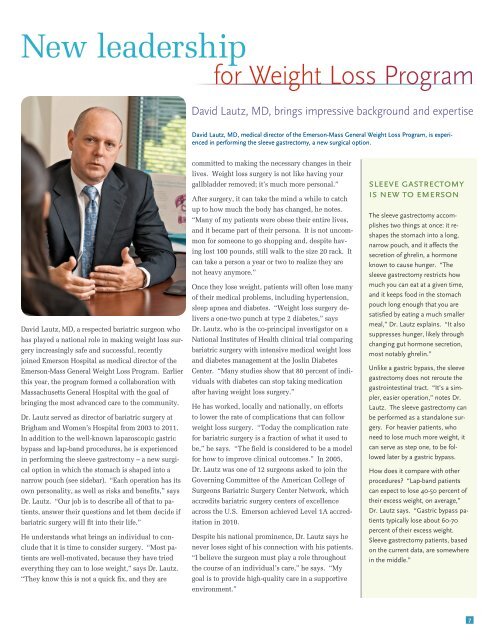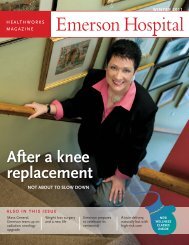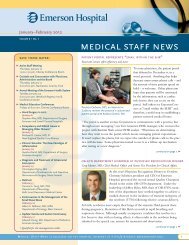Download PDF - Emerson Hospital
Download PDF - Emerson Hospital
Download PDF - Emerson Hospital
- No tags were found...
You also want an ePaper? Increase the reach of your titles
YUMPU automatically turns print PDFs into web optimized ePapers that Google loves.
New leadershipfor Weight Loss ProgramDavid Lautz, MD, brings impressive background and expertiseDavid Lautz, MD, medical director of the <strong>Emerson</strong>-Mass General Weight Loss Program, is experiencedin performing the sleeve gastrectomy, a new surgical option.David Lautz, MD, a respected bariatric surgeon whohas played a national role in making weight loss surgeryincreasingly safe and successful, recentlyjoined <strong>Emerson</strong> <strong>Hospital</strong> as medical director of the<strong>Emerson</strong>-Mass General Weight Loss Program. Earlierthis year, the program formed a collaboration withMassachusetts General <strong>Hospital</strong> with the goal ofbringing the most advanced care to the community.Dr. Lautz served as director of bariatric surgery atBrigham and Women’s <strong>Hospital</strong> from 2003 to 2011.In addition to the well-known laparoscopic gastricbypass and lap-band procedures, he is experiencedin performing the sleeve gastrectomy – a new surgicaloption in which the stomach is shaped into anarrow pouch (see sidebar). “Each operation has itsown personality, as well as risks and benefits,” saysDr. Lautz. “Our job is to describe all of that to patients,answer their questions and let them decide ifbariatric surgery will fit into their life.”He understands what brings an individual to concludethat it is time to consider surgery. “Most patientsare well-motivated, because they have triedeverything they can to lose weight,” says Dr. Lautz.“They know this is not a quick fix, and they arecommitted to making the necessary changes in theirlives. Weight loss surgery is not like having yourgallbladder removed; it’s much more personal.”After surgery, it can take the mind a while to catchup to how much the body has changed, he notes.“Many of my patients were obese their entire lives,and it became part of their persona. It is not uncommonfor someone to go shopping and, despite havinglost 100 pounds, still walk to the size 20 rack. Itcan take a person a year or two to realize they arenot heavy anymore.”Once they lose weight, patients will often lose manyof their medical problems, including hypertension,sleep apnea and diabetes. “Weight loss surgery deliversa one-two punch at type 2 diabetes,” saysDr. Lautz, who is the co-principal investigator on aNational Institutes of Health clinical trial comparingbariatric surgery with intensive medical weight lossand diabetes management at the Joslin DiabetesCenter. “Many studies show that 80 percent of individualswith diabetes can stop taking medicationafter having weight loss surgery.”He has worked, locally and nationally, on effortsto lower the rate of complications that can followweight loss surgery. “Today the complication ratefor bariatric surgery is a fraction of what it used tobe,” he says. “The field is considered to be a modelfor how to improve clinical outcomes.” In 2005,Dr. Lautz was one of 12 surgeons asked to join theGoverning Committee of the American College ofSurgeons Bariatric Surgery Center Network, whichaccredits bariatric surgery centers of excellenceacross the U.S. <strong>Emerson</strong> achieved Level 1A accreditationin 2010.Despite his national prominence, Dr. Lautz says henever loses sight of his connection with his patients.“I believe the surgeon must play a role throughoutthe course of an individual’s care,” he says. “Mygoal is to provide high-quality care in a supportiveenvironment.”sleeve gastrectomyis new to emersonThe sleeve gastrectomy accomplishestwo things at once: it reshapesthe stomach into a long,narrow pouch, and it affects thesecretion of ghrelin, a hormoneknown to cause hunger. “Thesleeve gastrectomy restricts howmuch you can eat at a given time,and it keeps food in the stomachpouch long enough that you aresatisfied by eating a much smallermeal,” Dr. Lautz explains. “It alsosuppresses hunger, likely throughchanging gut hormone secretion,most notably ghrelin.”Unlike a gastric bypass, the sleevegastrectomy does not reroute thegastrointestinal tract. “It’s a simpler,easier operation,” notes Dr.Lautz. The sleeve gastrectomy canbe performed as a standalone surgery.For heavier patients, whoneed to lose much more weight, itcan serve as step one, to be followedlater by a gastric bypass.How does it compare with otherprocedures? “Lap-band patientscan expect to lose 40-50 percent oftheir excess weight, on average,”Dr. Lautz says. “Gastric bypass patientstypically lose about 60-70percent of their excess weight.Sleeve gastrectomy patients, basedon the current data, are somewherein the middle.”7
















